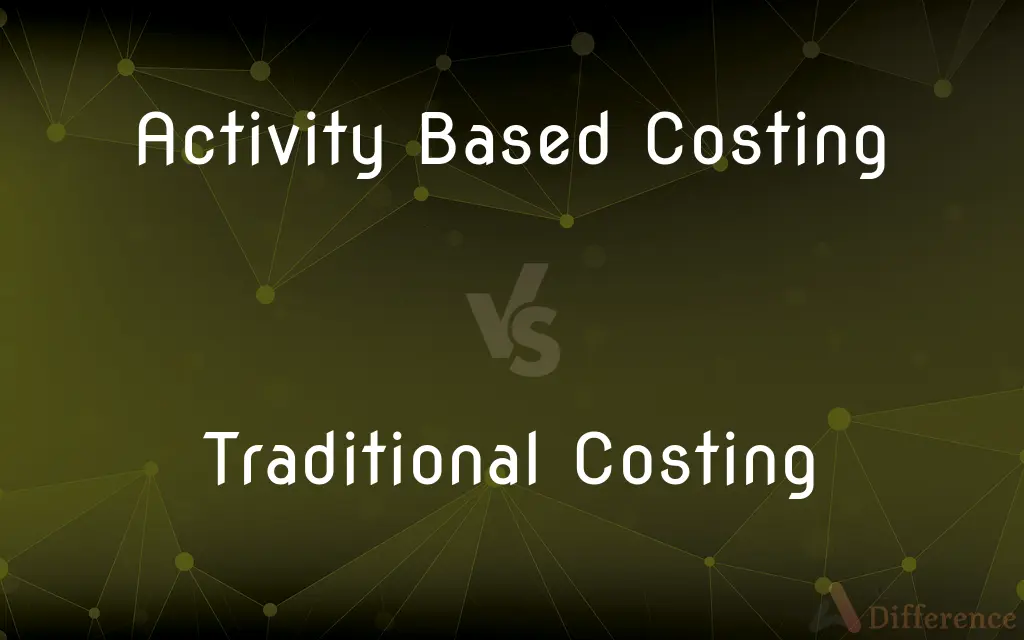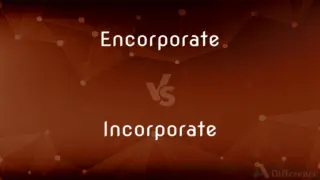Activity Based Costing vs. Traditional Costing — What's the Difference?
By Tayyaba Rehman — Published on October 8, 2023
Activity Based Costing allocates costs based on activities and resource usage; Traditional Costing allocates costs based on production volume.

Difference Between Activity Based Costing and Traditional Costing
Table of Contents
ADVERTISEMENT
Key Differences
Activity Based Costing (ABC) and Traditional Costing are two distinct approaches to allocate costs in manufacturing and service industries. ABC is a costing method that assigns costs to products based on the activities and resources used in the production process. This method allows for a more precise and detailed allocation of indirect costs to products, aiding in more accurate product costing and pricing. On the contrary, Traditional Costing allocates overhead costs based on a single, volume-based cost driver, such as labor hours or machine hours, potentially leading to cost distortions.
Tayyaba Rehman
Oct 08, 2023
In a highly competitive and dynamic business environment, Activity Based Costing offers an edge by providing accurate cost information, which is crucial for pricing, product mix, and profitability analysis. It helps in eliminating non-value-adding activities, optimizing resource utilization, and enhancing operational efficiency. Conversely, Traditional Costing, despite its simplicity and ease of use, may not fully capture the complexity of modern production processes and might provide misleading cost information, impacting pricing and profitability.
Tayyaba Rehman
Oct 08, 2023
While Activity Based Costing’s comprehensive approach facilitates a detailed understanding of cost components and drives efficiency, its implementation can be complex, time-consuming, and costly. Traditional Costing, being less detailed and more straightforward, is easier to implement and manage but may lack the accuracy and specificity in cost allocation that modern, diverse product lines require. Hence, the choice between ABC and Traditional Costing depends largely on the organization’s specific needs, product diversity, and available resources.
Tayyaba Rehman
Oct 08, 2023
To sum up, while Activity Based Costing stands out for its precision, detail, and accuracy in cost allocation, its complexity and implementation cost are considerable. Traditional Costing, with its simplicity and ease of implementation, remains relevant, especially for organizations with less product diversity and simpler production processes. However, the risk of inaccurate cost information due to its generalized approach to overhead allocation should be acknowledged.
Tayyaba Rehman
Oct 08, 2023
Activity Based Costing is meticulous and nuanced, providing insights into the true cost of products by considering various cost drivers and their impact on product cost. It helps organizations understand the cost behavior and utilization of resources, enabling effective cost management and strategic decision-making. In contrast, Traditional Costing, with its simplified approach, tends to generalize overhead allocation, often overlooking the diversity in products’ consumption of overhead resources, possibly leading to over-costing or under-costing of products.
Tayyaba Rehman
Oct 08, 2023
ADVERTISEMENT
Comparison Chart
Complexity
More complex and time-consuming
Simplified and easier to implement
Tayyaba Rehman
Oct 08, 2023
Cost Distortion
Minimizes cost distortions
Prone to cost distortions due to generalized allocation
Tayyaba Rehman
Oct 08, 2023
Application Suitability
Diverse and complex product lines
Less product diversity and simpler processes
Tayyaba Rehman
Oct 08, 2023
ADVERTISEMENT
Definitions
Activity Based Costing
Activity Based Costing is complex, time-consuming, and can be costly to implement but offers precise cost information.
Despite the complexities and time involved, the company opted for Activity Based Costing to obtain precise cost information.
Tayyaba Rehman
Sep 30, 2023
Traditional Costing
Traditional Costing is a method that allocates overhead costs based on a single, volume-based cost driver.
The firm used Traditional Costing, allocating overhead costs based on machine hours utilized in production.
Tayyaba Rehman
Sep 30, 2023
Activity Based Costing
Activity Based Costing is a method that assigns costs to products based on the activities and resources used in the production process.
The company adopted Activity Based Costing to gain accurate insights into the true cost of each product.
Tayyaba Rehman
Sep 30, 2023
Traditional Costing
Traditional Costing tends to generalize overhead allocation and may lead to over-costing or under-costing of products.
The simplified approach of Traditional Costing resulted in the under-costing of some products, impacting profitability.
Tayyaba Rehman
Sep 30, 2023
Activity Based Costing
Activity Based Costing provides more precise and detailed allocation of indirect costs to products.
With Activity Based Costing, the company could allocate indirect costs more accurately, aiding in precise product pricing.
Tayyaba Rehman
Sep 30, 2023
Traditional Costing
Traditional Costing is less detailed but easier to implement and manage, suitable for simpler production processes.
For the company’s simple production processes, Traditional Costing was deemed suitable due to its ease of management.
Tayyaba Rehman
Sep 30, 2023
Activity Based Costing
Activity Based Costing is meticulous and nuanced, providing a detailed understanding of cost components and driving efficiency.
The nuanced approach of Activity Based Costing highlighted the inefficiencies in the production process, prompting optimization.
Tayyaba Rehman
Sep 30, 2023
Traditional Costing
Traditional Costing is straightforward and less time-consuming but may provide misleading cost information.
The ease and simplicity of Traditional Costing were appreciated, but the risk of misleading cost information raised concerns.
Tayyaba Rehman
Sep 30, 2023
Activity Based Costing
Activity Based Costing helps in understanding cost behavior and resource utilization, enabling effective cost management and strategic decision-making.
Implementing Activity Based Costing allowed the management to make informed strategic decisions based on accurate cost behavior insights.
Tayyaba Rehman
Sep 30, 2023
Traditional Costing
Traditional Costing may lack the accuracy and specificity in cost allocation required for modern, diverse product lines.
The lack of specificity in Traditional Costing was a concern for accurately pricing the diverse product lines.
Tayyaba Rehman
Sep 30, 2023
FAQs
What is the primary focus of Activity Based Costing?
Activity Based Costing focuses on assigning costs based on activities and resource usage, providing detailed and accurate cost information.
Tayyaba Rehman
Oct 08, 2023
How does Traditional Costing allocate costs?
Traditional Costing allocates overhead costs based on a single, volume-based cost driver, like labor or machine hours.
Tayyaba Rehman
Oct 08, 2023
Can Activity Based Costing aid in strategic decision-making?
Absolutely, Activity Based Costing provides precise cost information, aiding effective cost management and informed strategic decisions.
Tayyaba Rehman
Oct 08, 2023
Does Activity Based Costing help in optimizing resource utilization?
Yes, Activity Based Costing helps in identifying non-value-adding activities and optimizing resource utilization, enhancing operational efficiency.
Tayyaba Rehman
Oct 08, 2023
Is Activity Based Costing time-consuming?
Yes, implementing Activity Based Costing can be complex and time-consuming due to its detailed and nuanced approach.
Tayyaba Rehman
Oct 08, 2023
Is Activity Based Costing more accurate than Traditional Costing?
Yes, Activity Based Costing is generally more accurate as it considers multiple cost drivers, minimizing cost distortions.
Tayyaba Rehman
Oct 08, 2023
Is Traditional Costing easy to implement?
Yes, Traditional Costing is less detailed, straightforward, and easier to implement compared to Activity Based Costing.
Tayyaba Rehman
Oct 08, 2023
Can Traditional Costing lead to cost distortions?
Yes, Traditional Costing's generalized approach to overhead allocation can lead to over-costing or under-costing of products, causing cost distortions.
Tayyaba Rehman
Oct 08, 2023
Why might companies still opt for Traditional Costing?
Companies might opt for Traditional Costing due to its simplicity, ease of implementation, and suitability for less complex production processes.
Tayyaba Rehman
Oct 08, 2023
Is Traditional Costing suitable for all types of production processes?
Traditional Costing is more suitable for simpler production processes with less product diversity due to its generalized approach to cost allocation.
Tayyaba Rehman
Oct 08, 2023
Author Spotlight
Written by
Tayyaba RehmanTayyaba Rehman is a distinguished writer, currently serving as a primary contributor to askdifference.com. As a researcher in semantics and etymology, Tayyaba's passion for the complexity of languages and their distinctions has found a perfect home on the platform. Tayyaba delves into the intricacies of language, distinguishing between commonly confused words and phrases, thereby providing clarity for readers worldwide.

















































